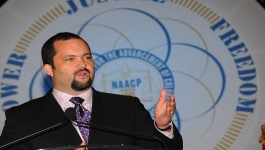BY NATASHA BARSOTTI – Even as the “It’s the economy,
stupid” mantra of the Clinton vs Bush #1 presidential
campaign is the issue at the forefront of the current run for the US presidency, the
fallout — both boo- and yay-worthy — from Obama’s supportive statement on gay
marriage continues to cascade into the 2012 election discourse.
![]()
On the yay side, the May 19 release of a National
Association for the Advancement of Colored People (NAACP) resolution on
same-sex marriage:
“. . . the NAACP has opposed and will continue to
oppose any national, state, local policy or legislative initiative that seeks
to codify discrimination or hatred into the law or to remove the Constitutional
rights of LGBT citizens,” the resolution states. “We support marriage
equality consistent with equal protection under the law provided under the
Fourteenth Amendment of the United States Constitution.”
Remember that in his own evolved gay-marriage stance,
Obama, unlike the NAACP, was careful not to trod on individual states’ abilities
to give a thumbs-up or -down to marriage rights for same-sex couples.
Even so, The Washington Post‘s Eugene Robinson points
out that the current president of the more than 100-year-old civil rights
organization, Benjamin Jealous, was also nuanced in his statement about
civil marriage being “a civil right and matter of civil law.”
Religious marriages are a different species as far as the NAACP is
concerned, and churches should not be coerced into giving their blessings to
same-sex marriages.

Still, almost all of the NAACP’s 64-member board voted in
favour of the landmark resolution, an evolved decision in itself. Its decision
to take a public stand lends increasing
weight to the ongoing, but often disputed, argument that gay rights are part and
parcel of the multifaceted American civil rights struggle.
In stark contrast, there’s the homophobic paroxysm in
North Carolina of the rant-and-rave religious kind, in tandem with the
state’s recent passage of the anti-gay-marriage, anti-civil-union Amendment
One.
You perhaps recall one North Carolina pastor’s advice
(Sean Harris) that parents punch their male children and crack their wrists if they are not
masculine enough. Then another (Ron Baity) invoked a return of the good old
days when queers were prosecuted, and a third (Tim Rabon) conjured up the now
more than yawn-inducing stereotype
about “redefinitions” of marriage that include human and beast
unions.
Now another, Charles Worley, has a somewhat novel idea to
stop queers in their tracks: “Build a great, big, large fence — 150 or 100 mile
long –– put all the lesbians in
there.”
And he elaborates:
“Do the same thing for the queers and the
homosexuals and have that fence electrified so they can’t get out . . . and you
know what? In a few years, they’ll die out . . . do you know why? They can’t
reproduce!”
Quite frankly, it’s not marriage that’s the worry here. It’s the quality of North Carolina’s water supply.
Landing image: transgriot.blogspot.com
YouTube video posted on huffingtonpost.com

 Why you can trust Xtra
Why you can trust Xtra


